by Jonathan Manafo | Apr 30, 2019 | Sunday Conversations
Trending this week on twitter and FB…Leafs game 7 (boooooooo) (sorry Leaf Fans).
Thankfully there were two other sports stories to replace it…The Raptors…Vladdy Jr. and the Blue Jays. (The Toronto Sports scene is in a good place)
Something topped that this week, not just in Toronto, but around the world…the release of Avengers EndGame. Not everyone is a fan, but many, many people are…all age groups in fact. (7-70)
Biggest #hastags by weeks end and into this weekend?
#DontSpoilEndgame (800 an hour)
#SpoilerEndgame (2400 an hour)
Also note worth, a man was beat up outside a theatre for spewing out spoilers…Ok, this could be fakenews, but it does make for a crazy story, doesn’t it?
Spoiler? What is it?
Sports: you’re not able to watch the game, you’re recording it, and you don’t want to know the score…
NetFlix: the crew you’re watching a show with watches the next episode without you (boooooo) especially if that crew is your spouse.
Movies: Don’t talk about the movie with people who haven’t seen it yet.
These are all ‘non-life-threatening’ spoilers. They only influence our desire for good entertainment.
Life Spoilers are obviously much worse and more real. Why is that?
- it’s not about the ‘a’ story, but ‘your’ story
- what you expect vs what actually happens
- what you hope for vs what transpires
In Ann Lamott’s recent book, Stitches, she talks about finally buying a house for her and her 10 year old son. They ere so excited. Unfortunately, they quickly found out that the previous owners had a few big dogs that weren’t trained so well. These dogs frequently peed on the floor. So much so that it got into the sub floor, into the joists, and into the basement. As she says so well, “That’s right, I moved into a house with dog urine in the joists.” Talk about a spoiler. If that happens to you, you have full permission to complain.
We all have our own stories, don’t we? We were well, until we weren’t, we had a job, until we didn’t, our family was doing well, until it wasn’t, the atmosphere at work was good, until the new guy or girl arrive, etc.
3 C’s accompany our real life spoilers: Confusion – Complaining – Crapp-i-ness.
– – – – – – –
 For the next few weeks (posts) we’ll be in a spring teaching series, The Middle.
For the next few weeks (posts) we’ll be in a spring teaching series, The Middle.
– faith and life intersect
– real faith is always intertwined in real life
– this is where questions, disappointment, tragedy, hurts, doubts, darkness, relationships, discernment, decisions, all happen.
– and when we ask things like, “where is God in the middle of all of this stuff?” and “how do I work through all of these feelings and emotions and issues?”
Scripture gives us permission to be confused, to complain, and to identify what is crappy in our life. The Bible is full of real stories about real people who are figuring out how to follow God.
I think all of scripture reflects this, but especially places like the Psalms.
- Honest, Raw, Real, Lament, Dark,
- Prayer/Conversation (btw, prayer is conversation)
- Psalm 13 is the classic tale of Why? Where? How? Trust!
God in the Middle of it All…
– – – – – – –
Habakkuk – a short book that does the same thing. It’s an expanded Psalm with a few more details, that ends with what some call a Psalm like text.
Look and Listen to the conclusion of Habakkuk…(3:2, 16-19)
Lord, I have heard of your fame;
I stand in awe of your deeds, Lord.
Repeat them in our day,
in our time make them known;
in wrath remember mercy…
I heard and my heart pounded,
my lips quivered at the sound;
decay crept into my bones,
and my legs trembled.
Yet I will wait patiently for the day of calamity
to come on the nation invading us.
Though the fig tree does not bud
and there are no grapes on the vines,
though the olive crop fails
and the fields produce no food,
though there are no sheep in the pen
and no cattle in the stalls,
yet I will rejoice in the Lord,
I will be joyful in God my Saviour.
The Sovereign Lord is my strength;
he makes my feet like the feet of a deer,
he enables me to tread on the heights.
These words, like those of the Psalms, have comforted people for years and years.
Verses 17-19 reflect Habakkuk’s perspective in a difficult situation…something we can all relate too.
But where does this start? What brings Habakkuk to this conclusion?
First, a little about the writer of this short story, Habakkuk.
– a prophet
– a minor prophet at that (compared to a major prophet)(two kinds in the OT)
– his role as prophet is to receive a message from God and share it with Israel…feel a burden from God and let Israel know about it.
– the (prophetic) message is meant to edify, build up, warn, sometimes judge and often or always critique in some way.
– Habakkuk believed that evil was real, and that we had to deal with it rather than run away from it.
– his name means, listen to this, embrace & wrestle. How appropriate (cf Jacob wrestling with God in Genesis 32)
– this challenges us to embrace what’s come our way, wrestle with it, and move forward because of it.
Seems like Israel is not living up to the ways God has called her to live…this upsets Habakkuk. A few spots of tension are…injustice, sin, loss of identity, etc.
Habakkuk does the one thing humans are good at: Complain. There’s tension, confusion, crap-i-ness. Instead of hiding it, repressing it, sweeping it under the proverbial rug, he addresses it – like his name means – he embraces it and wrestles with it.
Listen to these raw words from chapter 1…
How long, Lord, must I call for help,
but you do not listen?
Or cry out to you, “Violence!”
but you do not save?
3 Why do you make me look at injustice?
Why do you tolerate wrongdoing?
Destruction and violence are before me;
there is strife, and conflict abounds.
4 Therefore the law is paralyzed,
and justice never prevails.
The wicked hem in the righteous,
so that justice is perverted.
Habakkuk lays it on the table…he lets it go…
And the conversation begins with him…and with God
- Habakkuk complains
- God responds (not in the way Habakkuk wants)
- I’m going to do something, but with people that you least expect
- have you ever been taught a lesson from someone who you think very little of? That’s what’s going on here.
- Habakkuk complains again
- But God…how can you…(read below)
Lord, are you not from everlasting?
My God, my Holy One, you will never die.
You, Lord, have appointed them to execute judgment;
you, my Rock, have ordained them to punish.
13 Your eyes are too pure to look on evil;
you cannot tolerate wrongdoing.
Why then do you tolerate the treacherous?
Why are you silent while the wicked
swallow up those more righteous than themselves?
- God responds again (paraphrasing)
- Write down what I tell you
- Share it clearly
- Be patient
- Learn from this
- 5 Woes(judgements or critiques)for those who
- piles up wealth unethically
- build up their homes with unjust gain
- build a city with blood
- take advantage of neighbours
- trusts in idols they’ve created, more than God, who is ‘the’ creator
All this leads to what we read earlier from chapter 3. This conversation leads Habakkuk to pray these words…
Lord, I know who you are.
Lord, do what only you can do.
Lord, can you do those things for us – again?
And then, the way every good song or piece of music resolves, this song comes to an appropriate end…
17 Though the fig tree does not bud
and there are no grapes on the vines,
though the olive crop fails
and the fields produce no food,
though there are no sheep in the pen
and no cattle in the stalls,
What is your ‘though…’?
What is your ‘even if…’?
What is your normal conditions for success, growth, accomplishment, satisfaction?
Habakkuk is basically saying, even if things aren’t as I want them, as I see them, as I expect them to be. Still…yet…I will trust in God.
18 yet I will rejoice in the Lord,
I will be joyful in God my Saviour.
19 The Sovereign Lord is my strength;
he makes my feet like the feet of a deer,
he enables me to tread on the heights.
Here’s the clincher…
God wants to be in the middle of our confusion, complaining and crap-i-ness.
Spoilers will come. Things will blow up in front of you. Someone will say something, do something, ruin something – that effects you personally, or like Habakkuk, that effects you spiritually. But…
Don’t ever keep God out, let him in.
Don’t ever keep it from God, tell him everything.
Don’t ‘not ask questions’, instead, lay all your questions on the table.
And…don’t try and escape it, but let God walk you through it.
What does it look like for God to give you feet, shoes, tools, to walk through something and not around it?
Habakkuk doesn’t say, ‘remove me from this’, he says, give me what I need to walk through it. Enable me to tread on this rough terrain, through this rough season.
Pray this, would you…
God…stay here…with me…in the middle of this…let’s walk through this…together.
– – – – – – – – –
Week #1 Quotes:
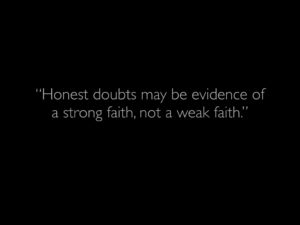
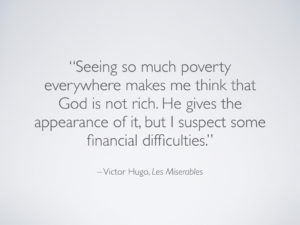
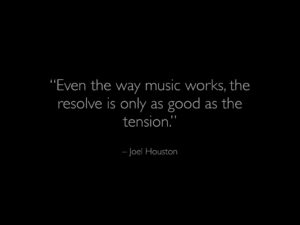
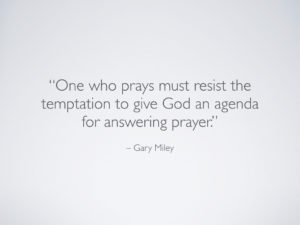
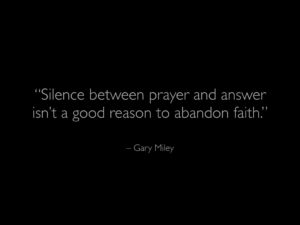
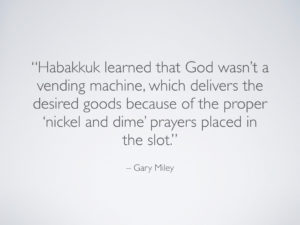
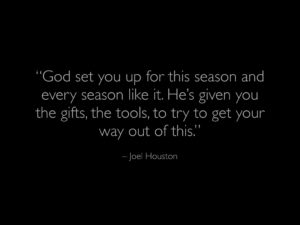

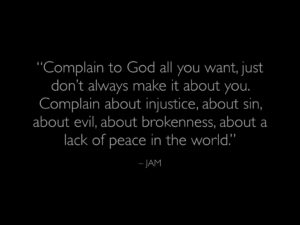
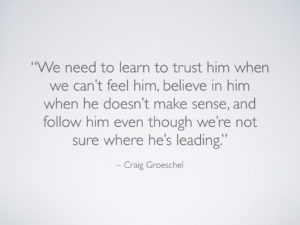
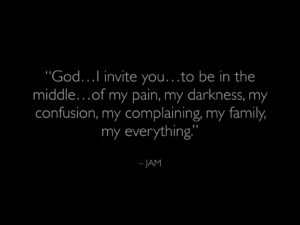
by Jonathan Manafo | Apr 23, 2019 | Sunday Conversations
I’ve been into this show on CTV lately. Anyone see this? God Friended Me?
- Miles: young communicator, podcaster, smart, thoughtful, caring, good guy, and an atheist
- his father is a church minister
- normally I stay away from these shows, for my fear that they’ll be predictable, but…I like this one
- There’s a God Account, it’s a FaceBook account, Miles gets friend requests from…GOD…or the God account
- These requests lead to opportunities to help people in various difficult circumstances
One of the the latest episodes was a doozy. It kind of brought the whole season together in many ways.
- a little girl Andrea passed away suddenly…her parents were distraught.
- Andrea played the violin beautifully.
- Her parents sold it, but then her mom had second thoughts and wanted it back.
- The packaged violin never arrived to the buyer. The buyer wanted it for her daughter, who was sick three years ago, and who was playing an upcoming recital. During the episode, Miles saw John, who happened to be this young violinists doctor. Miles found out that three years ago, when Andrea passed away, her parents decided to donate her organs, and her heart was eventually given to this young violinist who desperately needed a new heart.
- Andrea’s death, as unfortunate and tragic as it was, gave a new life, a renewed life, to another little girl. This and only this convinced Andrea’s mom to let the violin go.
- A new heart for a new life.
We find these very appropriate words in Ezekiel 36, “I will take your heart of stone and give you a heart of flesh.”
A pre-Easter text if I ever read one.
A New Beginning…that’s what Easter is. I really hope that’s what it is for you and for me.
We often get new beginnings wrong. We think starting fresh involves a new scenery, a new job, a new family, a new home. Those aren’t bad things, but they are simply exterior. What will only and ever make things new in you, is a new heart, a new perspective, a new way of living.
Starting over is…
Not about a new place, but a new purpose
Not about a new location, but a renewed love
Not about a new look, but a new life
Not about what I can do, but about what God already did for me
Not about how the world sees me (in person or online) but about how I see the world
In the story I just shared, for the young violinist, her new heart gave her new life. For Andrea’s mother, it was her sight that needed healing, her perspective cleared, her vision restored, for her to feel new again.
– – – – – – – –
Today I’d like us to walk through a different kind of Easter story. Not a traditional scripture for this day on the calendar, but one that, most definitely points to what happens because of Jesus in our lives…Jesus’ resurrection power in and through us.
Mark 8 is a turning point in the shortest of Gospel books. What happens to a blind man, and then to Jesus’ Disciples, feels like a shift in the story. It’s where Jesus turns from ‘listen to what I say’ to ‘look what I’m about to do’
(READ IT)
Mark 8:22-25…
They came to Bethsaida, and some people brought a blind man and begged Jesus to touch him. He took the blind man by the hand and led him outside the village. When he had spit on the man’s eyes and put his hands on him, Jesus asked, “Do you see anything?”
He looked up and said, “I see people; they look like trees walking around.”
Once more Jesus put his hands on the man’s eyes. Then his eyes were opened, his sight was restored, and he saw everything clearly.
‘Some People’
No name mentioned, but the impact is huge. No identity, but significant contribution.
Think about this, some body had to lead you to Jesus too. Some people were instrumental in helping you discover Jesus. We can look back, a short time or a long time ago, and be grateful for who ever that somebody was. Some of us need to be paying attention to God’s leading, because we can be that somebody of others.
‘he had spit on the mans eyes’
This is obviously unusual. Some (in the first century) would’ve believed this was normal healing practice, others thought of it as disgusting. In any given crowd you’ll some that don’t think anything of it, and others who think it’s strange.
In a new movie about Jesus life, called Mary, Joaquin Phoenix actually refusing to act out a similar miracle. The miracle in this movie is the one where Jesus picks up dirt, spits in it, mixes it, puts it on a blinds man eye, asks the man to wash his face, and the man is healed. Phoenix didn’t think it was necessary to be detailed about this incident. Why? He thought it was ‘a little much’. Everyone has their right to their own opinion. (Though it’s funny and ironic that Phoenix is playing the Joker in an upcoming film)
Whatever you think of his method, what Jesus is about to do is amazing.
‘Do you see anything?’
Jesus the tests the miracle.
‘I see people, but they look like trees’
If Jesus was a scientist, he’d check out his formula, and see what went wrong: Not a enough saliva? Did I touch his eyes too long or not long enough?
This begs a question. Do you ever feel like Jesus didn’t do enough? Like he only healed ½ way? Why?
This is the only 2-stage Miracle in the NT. No where else in the NT do we see Jesus have to do ‘a little more’ to finish up the miracle.
The point of the story is this…
‘Once more Jesus put his hands on the man’s eyes. Then his eyes were opened, his sight was restored, and he saw everything clearly.’
New life for this man wasn’t about how people saw him, but about how he saw others. Sure, people may look at him differently now. But that’s not the miracle – the miracle is in how he sees the world around him. He went from nothing…to tree looking people…to seeing everything clearly
For this man, new sight = new life.
And for us, because of Jesus, new life = new sight.
People who live lives of purpose and impact, people who thrive, people who experience new life and new values, who really discover Jesus, don’t experience this because of the way others perceive them, though we are tempted and lured into thinking that, but it’s how we perceive the world…how we see the world, and then how we love the world.
Who doesn’t want to ‘see everything clearly’? I do. It’s from that vantage point, that my life will change. Circumstances may not change, but my view of it can. My neighbours may not change, but my view of them can. My job might not change, but my perspective of it can.

Think about the flowers and the perennials that will grow in these coming days…they don’t ask for new ground, they just hope for new life…they don’t say, I wish I was in that other garden, or that other flower bed, they simply expect to grow into a new and beautiful plant.
May we be the same.
May we ask God to do what only He can do, in the life that He’s given me.
May we pray, ‘God, give me eyes to see how powerful and life changing you are’.
How does this connect to the story Easter?
Well…the follow up story in Mark 8 is about another kind of blindness being healed. This time it’s the Disciples who can’t see clearly.
Jesus and his disciples went on to the villages around Caesarea Philippi. On the way he asked them, “Who do people say I am?”
They replied, “Some say John the Baptist; others say Elijah; and still others, one of the prophets.”
“But what about you?” he asked. “Who do you say I am?”
Peter answered, “You are the Messiah.”
It took them a while. It took a few questions. It took a few mistakes and wrong answers, a little trial and error, but Peter finally gets it right.
YOU ARE THE CHRIST. YOU ARE THE MESSIAH.
There are two kinds of vision impairment in Mark 8.
- one is physical
- one is spiritual
- both are healed
- both lead to new lives & new living
We need to ask ourselves this question. How do you see Jesus?
- a good friend, wise, a great story teller
- a good teacher, savvy, healer, …
He is definitely all of those things, but unless we see him as the CHRIST, as the MESSIAH, as the KING, we’ll never experience all that he has for us.
A few verses later, Jesus begins to prep his friends for his death & resurrection. As we said, the story in Mark’s gospel shifts. It started with new vision, new perspective – with a man, brought by ‘some people’ to Jesus – with a little spit, and a lot of power. Where will it begin for you? Where did it begin for you?
– – – – – – – –
May I desire God’s new heart for me…
May I receive new sight from Jesus…
May we see Jesus clearly, and see the world around us with new and fresh vision…
A fresh start begins with how we see the world, and how we see Jesus.
Spring is a reminder that from the same dirt, the same place, the same earth, something new arises. Let Easter be that for you…for me…for us.
Whatever part of your life needs a fresh start, some of it, or all of it – May the resurrection of Jesus be that fresh start for you.
Whatever it is that you need to see more clearly, may Jesus open your eyes to it.
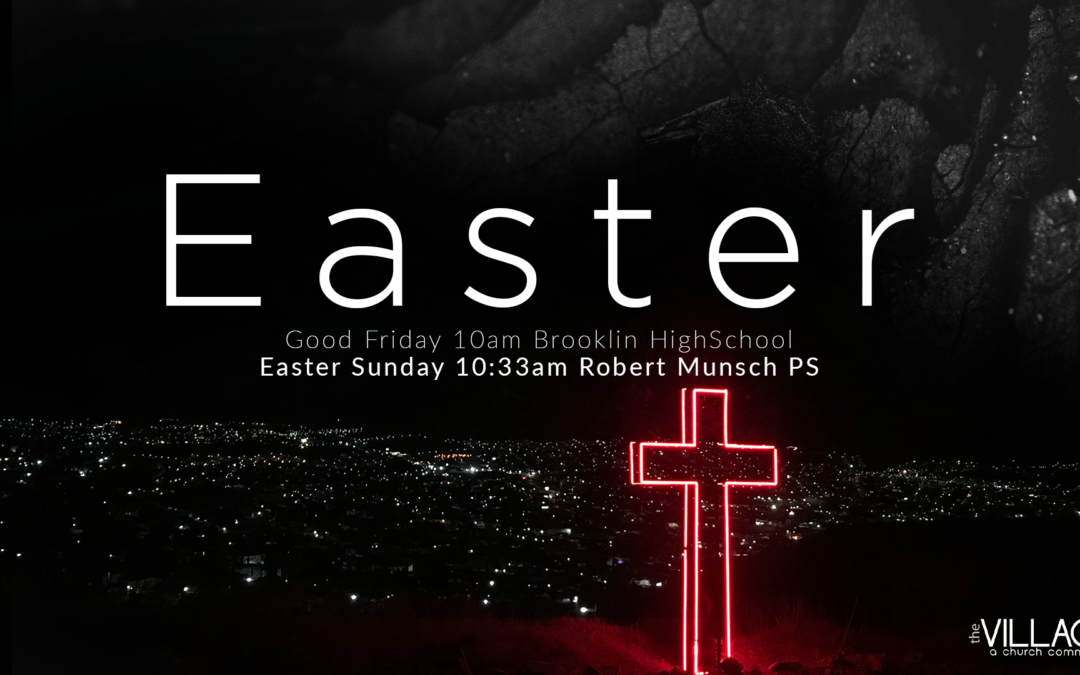
by Marquis Murray | Apr 12, 2019 | events
As Easter approaches, take some time to reflect on what Jesus did because of us. How he changed the course of history. Think and reflect on it as we prepare for this season of “Starting Over“.
Good Friday
- Friday, April 19, 10 am
- Brooklin High school
Easter Sunday
- Sunday, April 21, 10:33 am
- Robert Munsch Public School
We hope to see you there. Be sure to invite a friend (or five.)
by Jonathan Manafo | Apr 2, 2019 | Sunday Conversations
You may remember, in our last post, we started talking about activities that some find enjoyable, but others may actually find repulsive. Golf, Cleaning your house, Math, the Gym, and…Fishing. Ah, Fishing, an activity I never think about doing 🙂
All that was to lead us to this theme that we find in some parts of the Bible…stories that involve fish.
Brad Clarke started us off in the Fall…(Matthew 17, coin in mouth of a fish)
2 weeks ago we talked about Jesus calling Fishermen as his first Disciples.
In the fall we’ll hit the biggest of all Fish Stories…Jonah.
Today we jump into a story that, to be honest, the fish take such a small part of, but that’s the point of today’s text. It’s not about how much of the story you’re in, but that you’re in the right story. It’s not about how much you have to offer, but that you offer what you have. It’s not about the size of the your gift, but the willingness to give it, to use it, to share it, to see what God will do with the little that you have.
You’ll find today’s story in all 4 gospels. There are a few differences, as the gospels often offer, but otherwise basically the same. In Matthew’s version, it’s bookended with a story about John the Baptist’s death, and Jesus walking on water. One about grief, one about faith, and in the middle, one about Jesus doing what Jesus does with the little we have to offer.
It’s in Matthew 14:13-21, where we read about Jesus feeding 5000+ people.
(more like 15-20000)
Definitely one of Jesus ‘greatest’ and most ‘popular’ miracles…if we’re grading them 😉
Why? Simply the sheer number of people affected, and the craziness of the story. Let’s get into it and see why there’s more to this story than a crowd, a big dinner, and enough leftovers to feed an army.
– – – – – – –
13 When Jesus heard what had happened, he withdrew by boat privately to a solitary place. Hearing of this, the crowds followed him on foot from the towns.
In the verses just before, we find a gruesome story. John the Baptist, Jesus’ cousin, was beheaded. All this because the King’s daughter asked for his head on a platter, and the King obliges. So sad.
So when Matthew says, ‘Jesus heard what had happened.’ That is what happened.
And what was Jesus’ reaction? To be alone.
When were you last really sad? Death of a loved one, a break up, you didn’t get the job you wanted and thought you’d be getting, etc. In moments like these, you might wanna hide. You cancel your plans, you say no to your friend’s invites, and you stay home, or go to your favourite ‘alone’ spot. Jesus didn’t have Netflix to binge on, so solitude actually meant solitude.
Jesus is no different. That is his plan. To be alone. But that plan doesn’t transpire.
14 When Jesus landed and saw a large crowd, he had compassion on them and healed their sick.
You get to your favourite spot and you see someone you know (bad timing).
You just settle into a night alone and the door bell rings. (bad timing)
It could be your best friend in these situations, but you don’t want to see anybody. (bad timing)
The crowd beats Jesus to his ‘alone’ spot. Not only is he interrupted, but they even get there before him.
3 things happen:
– He SAW people
– He had COMPASSION on them
– He HEALED their sicknesses
The only thing that could’ve changed his plans? COMPASSION. It always wins at the end of day.
- Compassion isn’t just feeling bad for someone, it’s feeling what they feel.
- It’s like you are suffering what they are suffering…you are suffering with them.
- It’s more than ‘too bad’…it’s more like…I see your pain, I feel your pain, how can I alleviate your pain.
15 As evening approached, the disciples came to him and said, “This is a remote place, and it’s already getting late. Send the crowds away, so they can go to the villages and buy themselves some food.”
I love this scene. The Disciples are thinking, ‘good job Jesus, but let’s get these people out of here, it’s getting close to dinner.’ Smart. They propose an idea to Jesus. Jesus, of course, says, I take your idea, and I’m going to expand it.
16 Jesus replied, “They do not need to go away. You give them something to eat.”
Jesus takes good ideas and turns them into great ideas…or crazy ideas, depending how you look at them. Probably more like crazy ideas that turn into great ideas.
His COMPASSION compels him to go further. They’re hungry? Let’s feed them ourselves. The disciples might say, ‘of course Jesus, that would be the more ‘compassionate’ thing to do…let’s go with your idea…as crazy as it is…BUT…
17 “We have here only five loaves of bread and two fish,” they answered.
Words many of us have said before…WE ONLY HAVE…or…I DON’T HAVE enough.
These are regular, everyday, human reactions.
Here’s where the fish come into play. Told you… they are a very small part of this story. Only two of them. That’s it. Two fish.
What part do you play? Do you see yourself as insignificant? Or can you appreciate the role that you play, the part that you contribute?
We think this about ourselves too often.
- I’m not enough
- I don’t have what it takes
- I don’t have much to offer
- I ONLY HAVE 5 loaves & 2 fish
Just then, Jesus offers some of the best words we’ve heard uttered from him…
18 “Bring them here to me,” he said.
What do you have? OK. Offer it up. Give it to me. Hand them over. I’ll work with what you have.
I was at a leadership conference many years ago. It was inspiring and challenging and somewhat overwhelming too. I happened to meet one of the key speakers, and when I introduced myself I said, “Hi, my name is Jonathan Manafo, I’m just a 29 year old pastor from Canada.” And he replied with one simply, but powerful word, “JUST?”
Those are Jesus’ words to the Disciples and to us. JUST? You don’t ‘just’ have 5 loaves. You don’t ‘just’ have 2 fish. You HAVE 5 loaves and 2 fish.
BRING ME WHAT YOU HAVE.
NT Wright comments on these verses by saying,
Jesus takes ideas, loaves and fishes, money, a sense of humour, time, energy, talents, love, artistic gifts, skill with words, quickness of eye or fingers, whatever we have to offer. He holds them before his Father with prayer and blessing. Then, breaking them, so they are ready for use, he gives them back to us, to give to those who need them.
19 And he directed the people to sit down on the grass. Taking the five loaves and the two fish and looking up to heaven, he gave thanks and broke the loaves. Then he gave them to the disciples, and the disciples gave them to the people.
This is interesting…Jesus takes the food, prays for it, breaks the bread, and gives it back to his Disciples.
Jesus will always turn back to us and say, ‘you in?’ Let’s do this together.
So instead of worrying about what you don’t have, Jesus reminds us to thank God for what we do have, and then use it.
The story ends with…
20 They all ate and were satisfied, and the disciples picked up twelve basketfuls of broken pieces that were left over. 21 The number of those who ate was about five thousand men, besides women and children.
– – – – –
Let’s wrap things up with a few questions…
Will we be like Jesus and let compassion influence our actions & reactions?
- Jesus eventually does get some rest and alone time, we should too. But if we choose to be people of compassion, sometimes the rest will have to wait, but the possibility for a miracle goes way up.
- Simply put, compassion may take over, and if it does, follow it to see what happens.
Will we let Jesus take our good ideas and turn them into great ideas?
- Brainstorming in team settings is always the best way to arrived a preferred outcome, the same goes with Jesus. Don’t be afraid to offer up an idea, and don’t be sad when a better one comes along.
- Jesus’ ideas might even be crazy, but they are definitely worth entertaining if they come from him.
Will we let Jesus use our limited resources and turn them into miracles?
- Only in John’s gospel do we read about a boy in this story. He gave what he had, his lunch that contained only 5 loaves and 2 fish. And guess what? Jesus did what only he could do, and turned it into a feast.
- A lunch combo into a FEAST. Crazy? Yes. Amazing? YES.
I leave you with one line to remember and think about…
“Jesus wants what we think we don’t have, to help us do things we think we can’t do.”
 For the next few weeks (posts) we’ll be in a spring teaching series, The Middle.
For the next few weeks (posts) we’ll be in a spring teaching series, The Middle.













